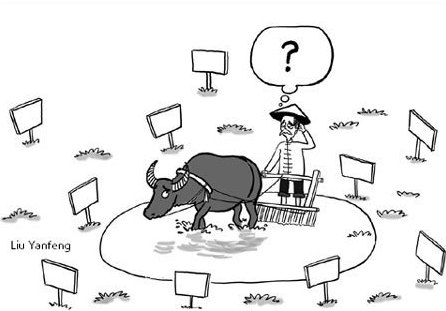
|
BIZCHINA> Review & Analysis
 |
|
Debating crowd far from farmers' reality
By Ku Ma (China Daily)
Updated: 2009-08-04 07:56 Sitting on a chair in her humble teahouse, now surrounded by piles of rubble and bricks, Lao Zeng (respectful form of address meaning old Zeng), says she misses the days when she used to earn about 1,500 yuan ($219.57) a month to support her family. "Now it's almost empty," says the 40-plus woman, recalling the days when her business was running successfully. "Before they (officials) began demolishing our village we used to get about 20 customers a day. But after people left (the village), we get fewer and fewer customers." The demolition, she mentioned, started in June last year. The authorities in Chengdu, capital of Sichuan province, announced that Lao Zeng's village in southern Wuhou district would be acquired for real estate development. Housing prices in the area have been soaring with villas, supermarkets and stores flooding the landscape. To promote the overall development of the city and villages, the Chengdu government initiated a program in August 2007 to build 12 "urban villages" of 5.46 million sq m. It has already found investors for 11 "urban villages". Village and township governments had been leasing out arable land to factories and businesses, or acquiring it to build roads for the past 15 years. And since little money has trickled down to the villagers, Lao Zeng turned the first floor of her two-story house into a simple teahouse some years ago. She had changed half of her home to make some money to run her family, but now both are under threat. Dai Liangchen, the village chief, says that without any hearing before land requisition, those in charge of the Huaxing Street Office have demolished more than 40 houses of families that have moved out, while about 20 households, including that of Lao Zeng, have opposed the officials' offer. "We were told that we would get 52,800 yuan per person for vacating the house," Lao Zeng says.
 The demolition office has given two options to the villagers. The first is they can return to another village in three years to get a house - with a dwelling area of 42 sq m per family member. And the other is to accept compensation in cash: 1,200 yuan per sq m for the houses to be demolished. So Lao Zeng's five-member family faces two choices: to get a 210-sq-m house in three years, or a one-time payment. "The house promise doesn't sound bad. But the problem is that one year has passed, they haven't even dug a hole in the ground for the new buildings that are supposed to house us," she says. "We are afraid that we would become homeless like some people whose land was acquired for development four years ago. But then the compensation money is too little."
The investment promotion center of Huaxing office says the area will be developed as a business district and the local land authority will auction the 200 mu (1 mu = 666.7 sq m) rural land - starting from 3 million yuan per mu, or about 4,500 yuan per sq m after acquiring it. Although the huge gap in buying and selling prices is not satisfactory for those who have chosen to stay, forcible eviction at nearby Nanqiao village last winter was shocking. "People there were forced to leave and their houses demolished. A small businessman's car was even smashed," Dai says. He agreed to move out in February under pressure. (For more biz stories, please visit Industries)
|